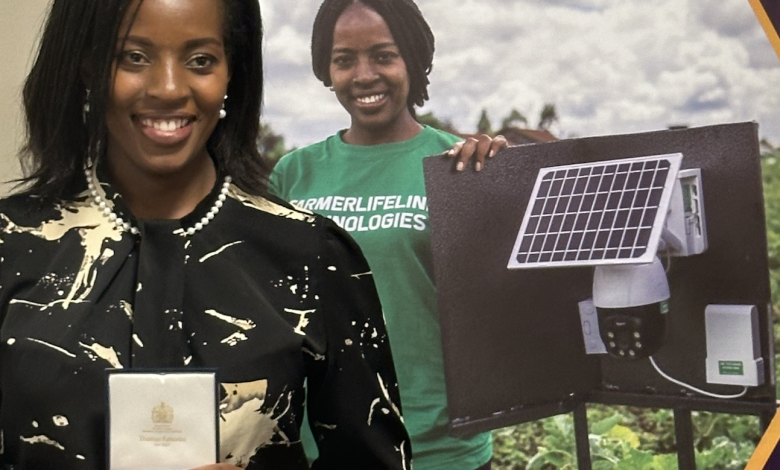In a continent where smallholder farmers produce up to 80 percent of the food consumed yet lose nearly 40 percent annually to pests and diseases, Kenyan startup Farmer Lifeline is rewriting the story of agricultural resilience.
Founded in 2019 by Esther Kimani, the company is harnessing artificial intelligence (AI) to give African farmers real-time insights into crop health, detecting threats early, reducing losses, and improving productivity.
“By integrating AI with locally adaptable practices, we aim to close the gap between farmers and agronomic expertise,” Kimani stated.
Her mission, she says, is to “empower smallholder farmers with real-time insights that detect crop threats early, reduce losses, and increase productivity.”
What Is Farmer Lifeline?
Farmer Lifeline is a technology-driven agritech startup that builds AI-powered tools for smallholder farmers. The company’s innovation lies in its simple yet intelligent diagnostic system that uses data and machine learning to spot pests, diseases, or soil health issues before they destroy crops.
Farmers receive real-time alerts and recommendations through accessible platforms designed for local use.
Unlike imported tools or complex drone technologies that require specialized training, Farmer Lifeline’s solution is user-friendly and adaptable to rural farming contexts where access to digital infrastructure is limited.
How Farmer Lifeline benefits the Farmers
For millions of African farmers, the cost of agricultural consultancy or expert diagnosis is often out of reach. Kimani’s innovation provides affordable agronomic intelligence that could save livelihoods.
By helping farmers identify problems early, the system minimizes yield losses, cuts costs, and ensures more stable harvests.
“Africa’s smallholder farmers produce the bulk of the continent’s food supply, yet face annual crop losses of up to 40 percent from pests and diseases,” Kimani explained.
“Limited access to affordable agronomic services means these losses often go undiagnosed until it is too late.”
The startup’s AI-driven approach bridges that gap by democratizing access to expert-level insights, essentially bringing the agronomist to the farmer’s pocket.
Farmer Lifeline’s Targets and Plans for Expansion
Having achieved early revenue success through a blend of customer subscriptions, grants, and awards, Farmer Lifeline is now setting its sights on scaling across the continent.
“Global recognition, including honours from the United Nations and leading innovation networks, has reinforced the value of our work,” Kimani said.
The company plans to expand into new African markets where similar challenges persist, leveraging its recognition and funding to refine its technology and reach more farmers.
Its expansion strategy focuses on local adaptation, ensuring that every deployment aligns with the unique farming conditions of each region.
Why This Matters
Food insecurity remains one of Africa’s most pressing challenges. According to the Food and Agriculture Organization (FAO), over 282 million Africans, roughly one in five, are undernourished, largely due to poor yields and climate-related disruptions.
By empowering smallholders, who constitute over 60 percent of Africa’s agricultural labor force, AI-driven solutions like Farmer Lifeline could help stabilize food production and improve household incomes.
The initiative also aligns with global efforts toward Sustainable Development Goal 2 (Zero Hunger) by 2030.
Farmer Lifeline’s approach, combining AI innovation with human-centered design, not only strengthens food systems but also redefines how technology can serve as a tool for inclusion and resilience.
A Growing Ecosystem of Smart Farming
Farmer Lifeline’s rise mirrors a broader shift toward digital agriculture in Africa.
From Kenya’s precision farming startups to Nigeria’s drone-powered cooperatives, tech-driven solutions are transforming how food is produced, distributed, and consumed. Yet, affordability remains a barrier.
“Our differentiation lies in building technology adapted for small-scale producers, with a focus on affordability and usability in resource-limited contexts,” Kimani emphasized.
This farmer-first approach positions Farmer Lifeline not just as a company, but as a movement redefining Africa’s agricultural future, one algorithm at a time.
Talking Points
Farmer Lifeline’s model represents a significant step toward bridging Africa’s agronomic divide, yet it also underscores the continent’s deeper struggle with systemic barriers in digital agriculture.
The startup’s success in deploying AI-powered crop diagnostics reflects both innovation and pragmatism, its focus on affordability and local adaptability acknowledges the reality that most African farmers operate in low-resource environments with limited access to expert guidance.
However, while the company’s vision is compelling, scalability remains its greatest test. Expanding across diverse agroecological zones will require not only strong data infrastructure but also sustained farmer education and government policy support to ensure equitable access.
Moreover, its reliance on grants and external recognition, though vital for early-stage growth, raises questions about long-term sustainability in markets where subscription models can falter due to low income levels.
Still, by positioning AI as an enabler rather than a replacement for human expertise, Farmer Lifeline offers a transformative template for inclusive agricultural innovation, one that, if scaled effectively, could redefine how technology tackles food insecurity across Africa.
______________________
Bookmark Techparley.com for the most insightful technology news from the African continent.
Follow us on X/Twitter @Techparleynews, on Facebook at Techparley Africa, on LinkedIn at Techparley Africa, or on Instagram at Techparleynews






